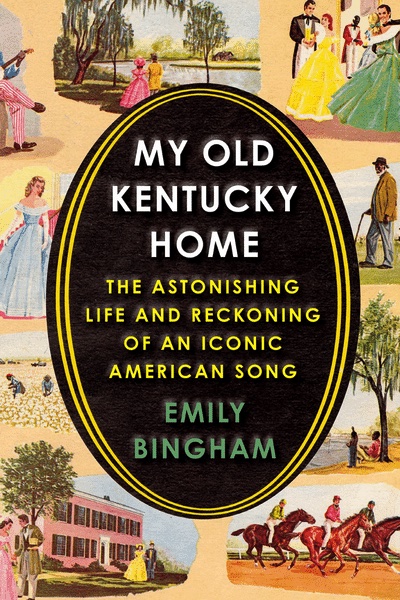 “People who love the song say there is . . . a kind of serenity, a sweet longing for something lost over the passing years, even if they cannot put into words what that something is. How this came to be, how the song so captured these people and a wider world, is the haunting question that the native Kentuckian Emily Bingham answers so thoroughly and forcefully in My Old Kentucky Home, her history of an American song . . . knowing its beginnings and long, tortured journey into a third century of painted-over suffering, [Bingham] reckoned that it did not belong to her, but to those wounded most by it; they should decide its future.” — Rick Bragg, The New York Times
“People who love the song say there is . . . a kind of serenity, a sweet longing for something lost over the passing years, even if they cannot put into words what that something is. How this came to be, how the song so captured these people and a wider world, is the haunting question that the native Kentuckian Emily Bingham answers so thoroughly and forcefully in My Old Kentucky Home, her history of an American song . . . knowing its beginnings and long, tortured journey into a third century of painted-over suffering, [Bingham] reckoned that it did not belong to her, but to those wounded most by it; they should decide its future.” — Rick Bragg, The New York Times
 “A powerful story of how, exactly, we fool ourselves into thinking the past is past . . . an account that is both riveting and thorough, taking us across a century of spinout marketing campaigns, protests and versions that emerged from Foster’s lyrics. Shirley Temple, Colonel Sanders, the country of Japan, Henrietta Vinton Davis, J.K. Lilly, Marian Anderson, Richard M. Nixon, the 31W Highway, “Mad Men”—and yes, the Kentucky Derby—are all summoned . . . Bingham’s research is finely detailed, extensive, complex. Further, her identity—and its many complications—is vital to her authority as a needed writer of this book.” — The Washington Post
“A powerful story of how, exactly, we fool ourselves into thinking the past is past . . . an account that is both riveting and thorough, taking us across a century of spinout marketing campaigns, protests and versions that emerged from Foster’s lyrics. Shirley Temple, Colonel Sanders, the country of Japan, Henrietta Vinton Davis, J.K. Lilly, Marian Anderson, Richard M. Nixon, the 31W Highway, “Mad Men”—and yes, the Kentucky Derby—are all summoned . . . Bingham’s research is finely detailed, extensive, complex. Further, her identity—and its many complications—is vital to her authority as a needed writer of this book.” — The Washington Post
 “A beautiful book. I was taken aback by how the song and its history, and Foster’s own history, are so much a part of our ongoing story. Bingham’s writing is compelling, and humbling, and moving.” — Rosanne Cash, singer, songwriter, and author
“A beautiful book. I was taken aback by how the song and its history, and Foster’s own history, are so much a part of our ongoing story. Bingham’s writing is compelling, and humbling, and moving.” — Rosanne Cash, singer, songwriter, and author
 “Beautifully written . . . deeply personal . . . riveting . . . Because [Bingham’s] personal and family experiences in so many ways parallel the song, this book can be characterized as a love letter — but one with tears in the eyes — to the commonwealth of Kentucky. The book also has a serious and important national reach.” — Courier Journal
“Beautifully written . . . deeply personal . . . riveting . . . Because [Bingham’s] personal and family experiences in so many ways parallel the song, this book can be characterized as a love letter — but one with tears in the eyes — to the commonwealth of Kentucky. The book also has a serious and important national reach.” — Courier Journal
 “Thoughtful . . . intensely moral . . . [Bingham] covers a spectacular amount of ground, from the origins of the song before the Civil War up to the present day . . . Engrossing twists and turns come with every chapter.” — Chapter 16
“Thoughtful . . . intensely moral . . . [Bingham] covers a spectacular amount of ground, from the origins of the song before the Civil War up to the present day . . . Engrossing twists and turns come with every chapter.” — Chapter 16
 “Emily Bingham has painstakingly created a history quilt out of the intricacies of the profound effects of a single song on American culture. The result is wonder and dismay—and a lesson for today in how propaganda works. The story is compelling because it is about us, all Americans. The song ties us together or divides us in ways that can make you shudder to know your part in it. And yet that seductive melody is there, drawing us along through our complicated history. Bingham doesn’t let us escape. We’re gripped by the story and enlightened by her telling. She delves into some of the deepest issues America has ever faced, issues that are still unresolved. This book is not simply about lyrics of a song but how that song has been used to tell a lie.” — Bobbie Ann Mason, author of In Country and Dear Ann
“Emily Bingham has painstakingly created a history quilt out of the intricacies of the profound effects of a single song on American culture. The result is wonder and dismay—and a lesson for today in how propaganda works. The story is compelling because it is about us, all Americans. The song ties us together or divides us in ways that can make you shudder to know your part in it. And yet that seductive melody is there, drawing us along through our complicated history. Bingham doesn’t let us escape. We’re gripped by the story and enlightened by her telling. She delves into some of the deepest issues America has ever faced, issues that are still unresolved. This book is not simply about lyrics of a song but how that song has been used to tell a lie.” — Bobbie Ann Mason, author of In Country and Dear Ann
 “One song, in Emily Bingham’s brilliant hands, brings history and memory together in ways all Americans must confront if we are ever truly to hear one another.” — Timothy Tyson, author of the New York Times bestseller The Blood of Emmett Till
“One song, in Emily Bingham’s brilliant hands, brings history and memory together in ways all Americans must confront if we are ever truly to hear one another.” — Timothy Tyson, author of the New York Times bestseller The Blood of Emmett Till
 “Henrietta Bingham’s greatest achievement was making people fall in love with her. Thus she offers a delicious excuse to be back in a time and among a group in which love was celebrated with gratifying complexity and tenderness . . . You can read Irrepressible strictly for plot because [Emily] Bingham . . . propels us along at the exhilirating clip of the sporty Sunbeam in which Henrietta drove her Bloomsbury friends around the British countryside. Its literary value, though, is that of an attenuated tragedy, reminding us of our continuing failure to help people, wealthy or poor, who can’t quite survive life, even as they try valiantly to live it.” ― Miranda Purves, The New York Times Book Review
“Henrietta Bingham’s greatest achievement was making people fall in love with her. Thus she offers a delicious excuse to be back in a time and among a group in which love was celebrated with gratifying complexity and tenderness . . . You can read Irrepressible strictly for plot because [Emily] Bingham . . . propels us along at the exhilirating clip of the sporty Sunbeam in which Henrietta drove her Bloomsbury friends around the British countryside. Its literary value, though, is that of an attenuated tragedy, reminding us of our continuing failure to help people, wealthy or poor, who can’t quite survive life, even as they try valiantly to live it.” ― Miranda Purves, The New York Times Book Review
 “Henrietta Bingham, the great-aunt of the author of this haunting biography, is best remembered for her association with the Bloomsbury group . . . Bingham captures both the giddy rebellion of her aunt’s youth and her slow, startling unravelling.” ― The New Yorker
“Henrietta Bingham, the great-aunt of the author of this haunting biography, is best remembered for her association with the Bloomsbury group . . . Bingham captures both the giddy rebellion of her aunt’s youth and her slow, startling unravelling.” ― The New Yorker
 “Henrietta Bingham was one of those entrancing creatures more often met in books than in life . . . Emily Bingham’s painstaking reconstruction of Henrietta’s story shows that she was a pioneer of sorts―a poignant case of a life unspooled before the world was ready for her odd grace.” ― Edward Kosner, The Wall Street Journal
“Henrietta Bingham was one of those entrancing creatures more often met in books than in life . . . Emily Bingham’s painstaking reconstruction of Henrietta’s story shows that she was a pioneer of sorts―a poignant case of a life unspooled before the world was ready for her odd grace.” ― Edward Kosner, The Wall Street Journal
 “In this sensitive and emotionally rich biography . . . [Henrietta Bingham] flashes unforgettably back into life.” ― Joanna Scutts, The Washington Post
“In this sensitive and emotionally rich biography . . . [Henrietta Bingham] flashes unforgettably back into life.” ― Joanna Scutts, The Washington Post
 “The life of Henrietta Bingham, as recounted by her great-niece Emily in Irrepressible, is so engrossing that readers will finish the book astonished at not having heard of her before . . . Emily Bingham has given us a faithful unretouched portrait of a bewitching, courageous, sometimes maddening woman . . . My advice is don’t wait for the movie–get a copy of this engaging book and read it now.” ― Jennie Rathbun, Lambda Literary
“The life of Henrietta Bingham, as recounted by her great-niece Emily in Irrepressible, is so engrossing that readers will finish the book astonished at not having heard of her before . . . Emily Bingham has given us a faithful unretouched portrait of a bewitching, courageous, sometimes maddening woman . . . My advice is don’t wait for the movie–get a copy of this engaging book and read it now.” ― Jennie Rathbun, Lambda Literary











